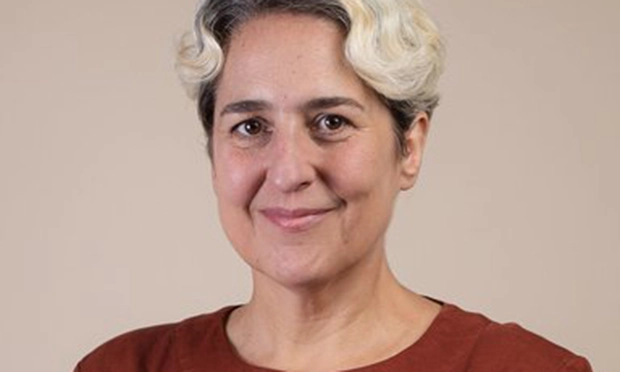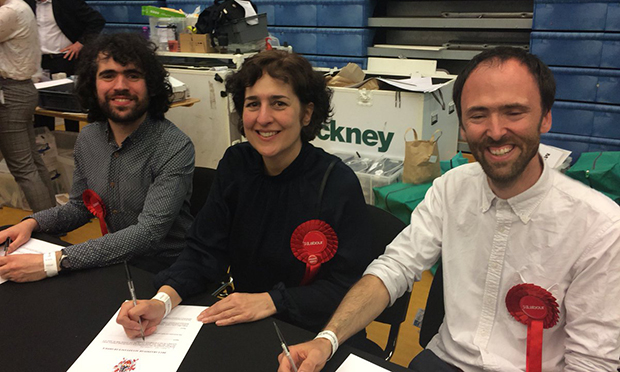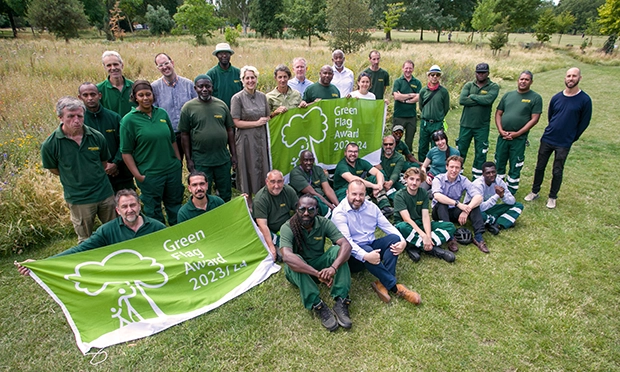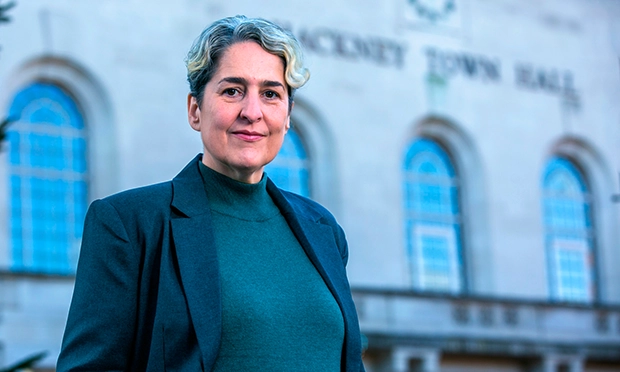‘What have I done?’ Hackney Mayor Caroline Woodley on her first 100 days in office

Hackney Mayor Caroline Woodley
Caroline Woodley moved to Hackney in 2001.
“I never thought I’d stay here for longer than a decade,” she confesses, but 23 years later she’s sat in a sizeable, wood-panelled office, reflecting on her first 100 days as the borough’s first female mayor.
Woodley joined the Labour party in 2015, following the Conservatives’ general election win.
“I thought it was quite frightening when the Tories won a majority on the ticket of austerity, and I wanted to get more involved,” she said.
However, it was her fellow female councillors who attracted Woodley to the world of local democracy.
Attending Labour party meetings, she witnessed these councillors at work, some of whom she now calls her colleagues.
“I was inspired,” she said, sitting up a little taller in her seat. “I felt like I had found my people.”
Three years later, she stood for election and won her seat as a ward councillor for Cazenove.
In her previous academic career, Woodley worked at the University of the Arts London, specialising in the arts and social change.
“There was a direct route from being within the theory and hypotheticals of political thinking into the practicality of policy-making of local government and delivering manifesto pledges and objectives.”
“At the time there were some difficult challenges within my ward,” she continued, and it was seeing the fruits of her labour that initially spurred Woodley on.
“I was quite amazed, really, by the opportunities and what you could make happen.”

Woodley with former Cazenove colleagues Sam Pallis and Anthony McMahon after being elected to the council in 2018. Photograph: Hackney Labour party / Twitter
In a short five years, Woodley quickly rose up the council ranks, eventually being appointed cabinet member for parks and green spaces before running for the highest political office.
But she said: “I don’t think mayor was ever the goal.”
Instead, the process behind the mayoral election was one of deliberation.
“When it came to deciding who was going to run for mayor, we were all thinking about who was best placed to do it.
“There were lots of conversations between colleagues, with cabinet members, just trying to determine who was willing, who was ready.
“It was a difficult time.”
Woodley recalled the apprehension she felt following the resignation of former mayor Philip Glanville, with a looming national recession to add to Hackney’s own budget struggles.
“I’m not sure there were too many people who were desperate to be mayor actually,” she said.
“I hope this doesn’t sound too self-effacing, but there was a sense of a kind of call of duty.”
Acknowledging that she did not have the “institutional memory” of some of the longer-serving councillors, Woodley said her decision to stand was on the provision that “everybody comes to help me”.

Woodley was previously cabinet member for parks, overseeing a record haul of Green Flag awards. Photograph: Hackney Council
The support is visible; Cllr Ian Rathbone was at her side, taking notes, throughout our interview – there as a councillor and not in his capacity as Hackney Labour’s press spokesperson, he insisted.
Woodley continued: “For me, being mayor was only ever going to be possible if I came in as a continuity candidate in terms of delivering the manifesto that everyone already felt really invested in.”
She pauses before adding: “But I’m organised, I’m compassionate, and I thought those would be good qualities to bring to the role.”
It was the night of her election that Woodley cited as her greatest highlight as mayor to date: “Being at the count, with my son, and just seeing that it was a substantial win.”
Woodley said she will “never forget” the sense of relief twinned with the promise of opportunity.
“I was stood in front of the Town Hall and thinking, ‘Oh my gosh, I’ve done it.’ And then a there was a terrifying moment of, like, ‘What have I done?’”
It was all systems go from there.
Within two hours of being elected, Woodley was at a Diwali celebration.
“I thought, ‘This is how it’s going to be now, isn’t it?’ I’m just going to bounce around from event to event, opportunity to opportunity, decisions here, and sort of dancing and singing and celebrating there, and that’s exactly how it’s been.
“For every challenge, every moment where you just feel quite low because of the difficulty of the choices that you’re faced with, you get lifted up again the next minute because you’ve got all these people on the ground who just really want to do the best by each other.”

Tackling the housing crisis is Woodley’s ‘most important challenge’. Photograph: Hackney Council
Woodley said her first couple of days as mayor involved being given a “bird’s-eye view” of the borough.
“You’re looking out across the borough, on the top of a rollercoaster, thinking ‘Am I going to go down cheering or screaming?’”
To ensure any screaming is kept to a minimum, Woodley says her approach to the mayoral role is balancing the bird’s-eye view with “trying to hear different voices to understand what each decision means”.
Treading this tightrope, her first few months have been spent focused on putting “some of our necessary commitments into practice”, building “strategic corporate partnerships”, lobbying for central government funding, and “making sure that we’re working effectively”.
“Coming in as a new mayor, there’s a chance to reset, and to look ahead – we are already looking to 2026, 2030,” Woodley continued. “And we’re investing in policy that doesn’t feel like it’s in isolation.”
According to Woodley, the biggest but also the most important challenge for her leadership will be the housing crisis.
“If you don’t solve housing, you don’t solve anything,” Woodley said, explaining how the crisis is woven into the fabric of every issue.
“Health, education, poverty – it’s all rooted in housing.”
“At times it’s easy to feel existential… [because] it’s a crisis,” she added. “And I feel like we were talking about the housing crisis years ago. I don’t know what you call it after you’ve had several years of crisis.”
She said that figuring out how to solve the housing crisis, and the poverty divide that it perpetuates, keeps her up at night, because “we can do all sorts of lovely things within our framework, but it won’t cut through if we don’t see more from central government.”
“We need to build more housing, have fair rent and more control over the whole piece. I have to believe that’s possible, or I’ll lose momentum.”

Well said John Anthony – as someone who has been on the sharp end of their corruption Having had my home destroyed, no school place for my son (along with 350 other children) and smear campaigns from corrupted officers. Each mayor has done nothing about it – except increase council tax which is the only thing they are efficient at